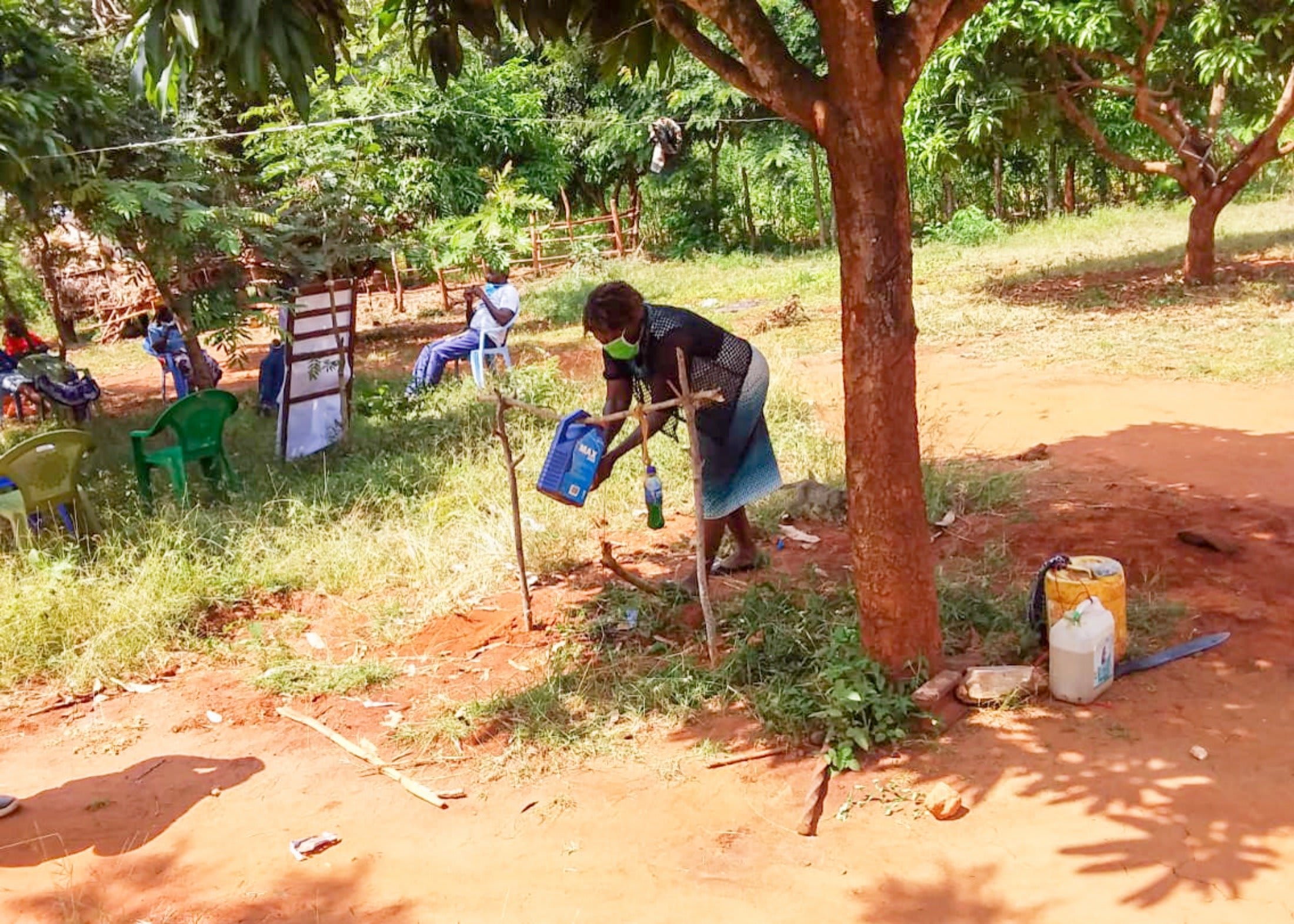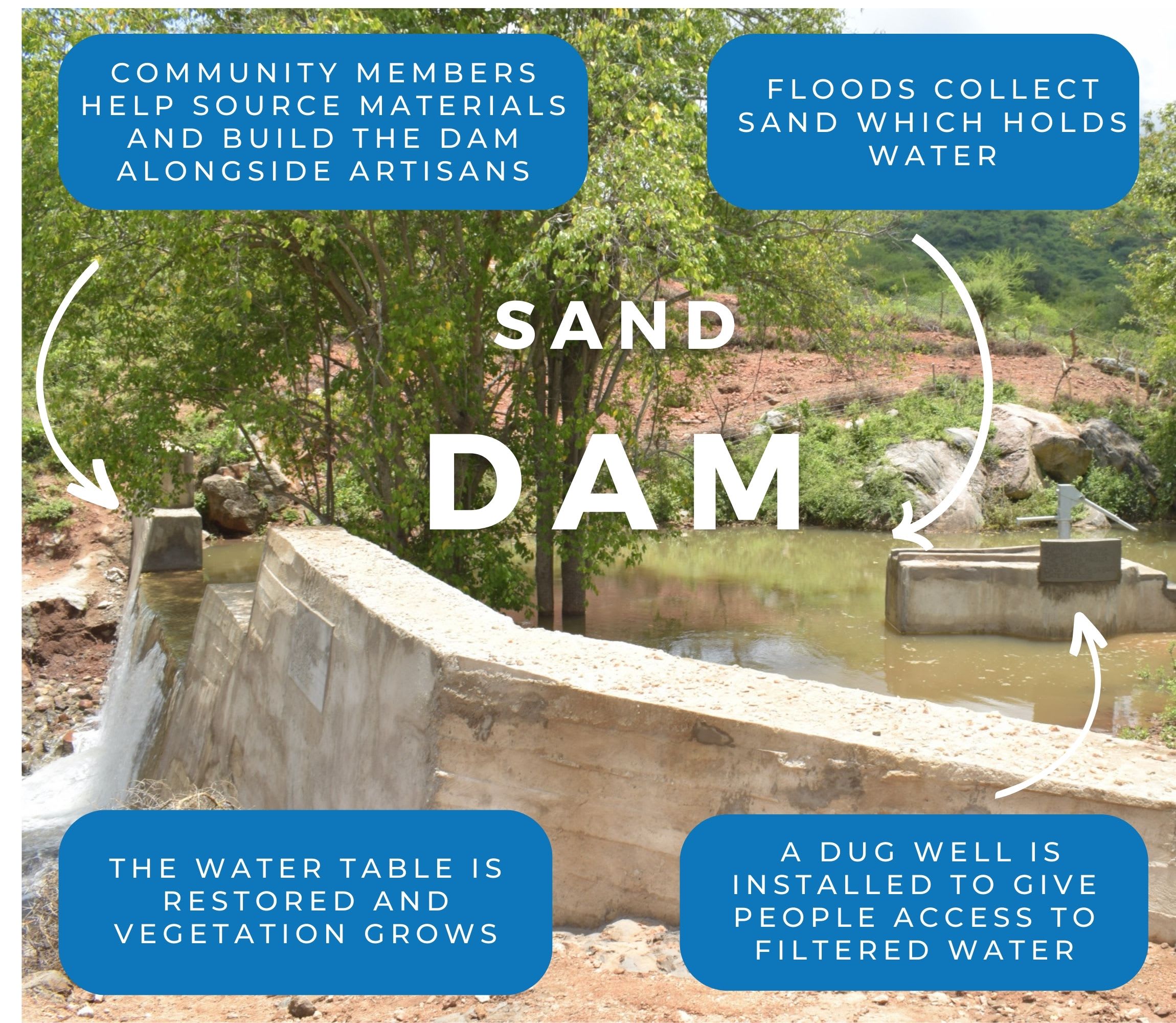June, 2020: COVID-19 Prevention Training Update at Ngitini Community
Our teams are working on the frontlines of the COVID-19 pandemic. Join us in our fight against the virus while maintaining access to clean, reliable water.

We are carrying out awareness and prevention trainings on the virus in every community we serve. Very often, our teams are the first (and only) to bring news and information of the virus to rural communities like Ngitini, Kenya.
We trained community members on the symptoms, transmission routes, and prevention of COVID-19.
Due to public gathering concerns, we worked with trusted community leaders to gather a select group of community members who would then relay the information learned to the rest of their family and friends.

We covered essential hygiene lessons:
- Demonstrations on how to build a simple handwashing station
- Proper handwashing technique
- The importance of using soap and clean water for handwashing
- Cleaning and disinfecting commonly touched surfaces including at the water point.

We covered COVID-19-specific guidance in line with national and international standards:
- Information on the symptoms and transmission routes of COVID-19
- What social distancing is and how to practice it
- How to cough into an elbow
- Alternative ways to greet people without handshakes, fist bumps, etc.
- How to make and properly wear a facemask.

During training, we installed a new handwashing station with soap near the community’s water point,
Due to the rampant spread of misinformation about COVID-19, we also dedicated time to a question and answer session to help debunk rumors about the disease and provide extra information where needed.
Water access, sanitation, and hygiene are at the crux of disease prevention. You can directly support our work on the frontlines of COVID-19 prevention in all of the communities we serve while maintaining their access to safe, clean, and reliable water.

March, 2020: Ngitini Community Sand Dam Complete!
Ngitini Community in Kenya now has access to a new source of water thanks to your donation. A new sand dam was constructed on a sandy riverbed, which will build up sand to raise the water table and naturally filter water.
"The water point is very pleasing and satisfying. The proximity of the water point to our homesteads is very close. Through the availability of water, we will engage in farming which is a stable income generator in this region," said Daniel Kyalo, a local farmer.

"All of the community members can now access water easily with no strains of having to trek for long distances or digging scoop holes to fetch water. The water point is safe and easily accessible for the members. We are very happy about this project."
We worked with the Kinyenyoni Kikuswi Self-Help Group for this project. The members and their families contributed materials and physical labor to complete the project. In addition, they were trained on various skills such as bookkeeping, financial management, project management, group dynamics, and governance. We also conducted a hygiene and sanitation training to teach skills like soapmaking and to help improve behaviors such as handwashing.

When an issue arises concerning the water project, the group members are equipped with the necessary skills to rectify the problem and ensure it works appropriately. However, if the issue is beyond their capabilities, they can contact our team of field officers to assist them.
Sand Dam
The community members collected all of the local materials like rocks and sand that were required for the successful completion of the dam. They also provided labor to support our artisans. The collection of raw construction materials takes longer than the actual construction. For a large sand dam, materials collection could take up to 4 months.

Siting and technical designs were drawn and presented to the Water Resources Management Authority and a survey sent to the National Environment Management Authority for approval before construction started. Once approved, we established firm bedrock at the base of the sand dam wall. (In the absence of good bedrock, excavation is done up to a depth at which the technical team is satisfied that the ground is firm enough to stop seepage.)
Then mortar (a mixture of sand, cement, and water) is mixed and heaped into the foundation. Rocks are heaped into the mortar once there is enough to hold. Barbed wire and rebar are used to reinforce the mixture.

Once the foundation is complete, a skeleton of timber is built to hold up the sludge and rocks above ground level. The process is then repeated until a sufficient height, width and length are built up. The vertical timber beams are dismantled and the dam is left to cure.
This dam measures 50.7 meters long and 4.65 meters high. It took 1050 bags of cement to build.

Sand dam construction was simultaneous to the construction of a hand-dug well, which gives locals a safer method of drawing water nearby. As the sand dam matures and stores more water, more of it will be accessible as drinking water from the well. To see that hand-dug well, click here.
As soon as it rains, the dam will begin to build up sand and store water. With this water, the surrounding landscape will become lush and fertile. However, it could take up to 3 years of rain for this sand dam to reach maximum capacity.
New Knowledge
The group members of the Kinyenyoni Kakuswi self-help group have participated in hygiene and sanitation training in the past as a part of completing other sand dam and well projects with us. They have been trained in group dynamics and governance, bookkeeping, project management, and water, hygiene, and sanitation practices.

But behavior change takes time, so we continue to work with the group to improve its hygiene and sanitation standards. Our hygiene and sanitation trainer conferred with the field staff about their previous visits to households and interviews with community members to determine which topics the community still could improve upon.
The members were requested to highlight a list of topics that they would love to cover and to be refreshed on. The following are the topics that were discussed: how diseases are spread; blocking the channels of disease transmission; and training on how to make soap for handwashing and household cleaning.

The training took place at Dorcas Wambua's homestead, a member of the group. Her compound was accommodating as it had adequate shade for everyone. All the members of the group participated equally by asking questions, contributing their opinions on how to improve hygiene standards in the area, and how love and unity will be embraced for building a strong bond between the members.
"The training will help us improve hygiene behaviors, prevent diarrheal diseases, and encourage community management of water and sanitation facilities. We now understand the importance of maintaining a clean environment at our homes," said Mr. Kyalo.
"This enables us to enhance and implement good relationships between sanitation and health status, therefore increasing the self-esteem of community members, empowering the community to plan environmental improvements, and to own and operate water and sanitation facilities responsibly."

The community has other sand dams and shallow well projects which they have been maintaining since they were constructed in their region. Once the project has a functionality issue the group members are responsible enough to conduct repairs on their own. If the water project issues are beyond their capabilities, however, the members know they can contact the area field officers who will inform the construction department to ensure the projects function appropriately.
Thank you for making all of this possible!

January, 2020: Ngitini Community sand dam underway!
A severe clean water shortage at Ngitini Community drains time, energy, and health from people here. Thanks to your generosity, we’re working to install a clean water point and much more.
Get to know this school through the introduction and pictures we’ve posted, and read about this water, sanitation and hygiene project. We look forward to reaching out with more good news!


 Sand Dam
Sand Dam
 Rehabilitation Project
Rehabilitation Project





































